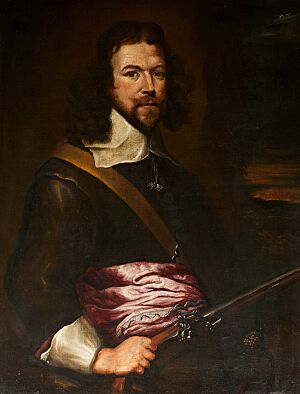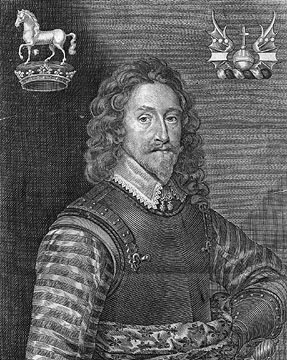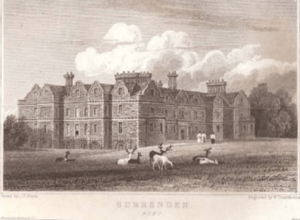Sir Edward Dering, 1st Baronet facts for kids
Sir Edward Dering (1598–1644) was an English gentleman who loved old books and history. He was also a politician during a very difficult time in England.

Contents
Early Life and Education
Edward Dering was born in the Tower of London on January 28, 1598. His father, Sir Anthony Dering, was in charge of the Tower at the time. Edward went to Magdalene College, Cambridge for his education.
Starting His Career
After college, Edward spent a lot of time studying old things. He loved collecting old books and handwritten documents. On January 22, 1619, he was made a knight. This was a special honor given by the King.
In November 1619, he married Elizabeth Tufton. Sadly, she passed away in 1622. Edward was a big fan of William Shakespeare. In 1623, he bought two copies of Shakespeare's famous book, the First Folio. This book was the first collection of Shakespeare's plays.
Edward married again in 1625 to Anne Ashburnham. Her family had connections to the King's friend, the Duke of Buckingham. Because of these connections, Edward was made a baronet in 1627. This was another special title. However, his political hopes were cut short when the Duke of Buckingham died in 1628. Edward's second wife, Anne, also passed away that same year.
After these sad events, Edward married his third wife, Unton Gibbs, in 1629. He also became the lieutenant of Dover Castle. This was a job he paid for, but it didn't bring him as much money as he hoped. Once he left that job, he could spend more time on his favorite hobby: studying history.
During the English Civil War
When the English Civil War began, Edward Dering first supported the King. He even helped raise a group of soldiers to fight for the King.
However, Edward was not really a soldier. He was often sick, and he didn't like the harsh life in the army. Even before a big battle called battle of Edgehill, he thought about leaving the King's side. He wanted to make peace with the Parliament, the other side in the war.
Edward eventually left the army in 1643. He found it hard to be at the King's court. On January 30, 1644, Parliament offered a way for people who had fought against them to be forgiven. Edward was one of the first to accept this offer. He was allowed to go home. He had to pay a large sum of money, but he passed away on June 22, 1644, before everything was settled. He had faced a lot of hardship after returning home.
Edward Dering believed strongly in peace. He wanted the King and Parliament to work together. He didn't like extreme ideas from either side.
Love for History and Old Documents
Edward Dering's passion for history led him to build a huge library. His name is still connected to two very important historical items:
- The Dering Roll: This is a very old list of coats of arms from the 1200s. It's thought to be the oldest surviving English list of its kind. The British Library bought it in 2008.
- The Dering Manuscript of Henry IV, Part 1: This is the oldest surviving handwritten copy of a play by William Shakespeare.
Edward was so interested in his family's history that he even added details to old documents and put up fake monuments in the church to make his family seem even older and more important!
Family Life
Sir Edward Dering was married three times:
- His first wife was Elizabeth Tufton. They married in 1619. Their only child, Anthony, passed away when he was 14.
- His second wife was Anne Ashburnham. They married in 1625. She was the mother of his son, Sir Edward Dering, 2nd Baronet. Anne passed away when she was only 23.
- His third wife was Unton Gibbes. They married in 1629. They had more children together.
Edward Dering was buried at St Nicholas' Church in Pluckley.
Books He Published
Edward Dering also wrote and published several books and speeches:
- The Four Cardinal Virtues of a Carmelite Friar, 1641.
- Four Speeches made by Sir E. Dering, 1641.
- A most worthy Speech ... concerning the Liturgy, 1642.
- A Collection of Speeches made by Sir E. Dering on Matters of Religion, 1642.
- A Declaration by Sir E. Dering, 1644.
- A Discourse of proper Sacrifice, 1644.
 | Chris Smalls |
 | Fred Hampton |
 | Ralph Abernathy |



